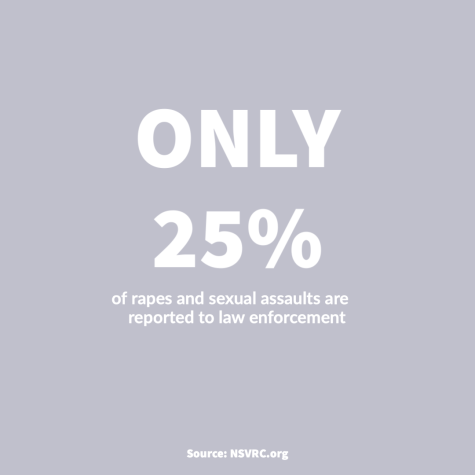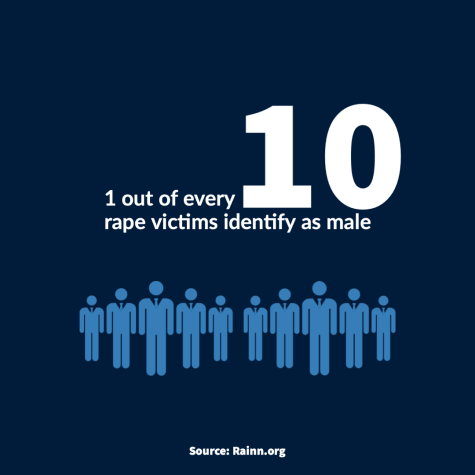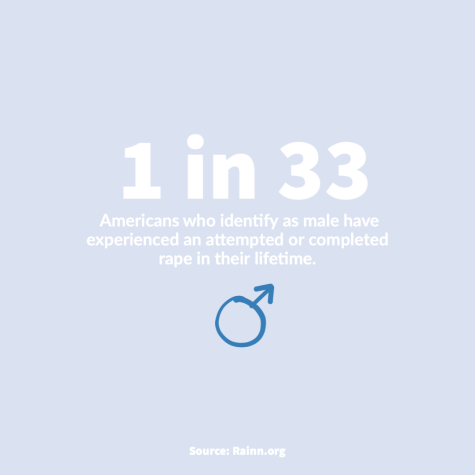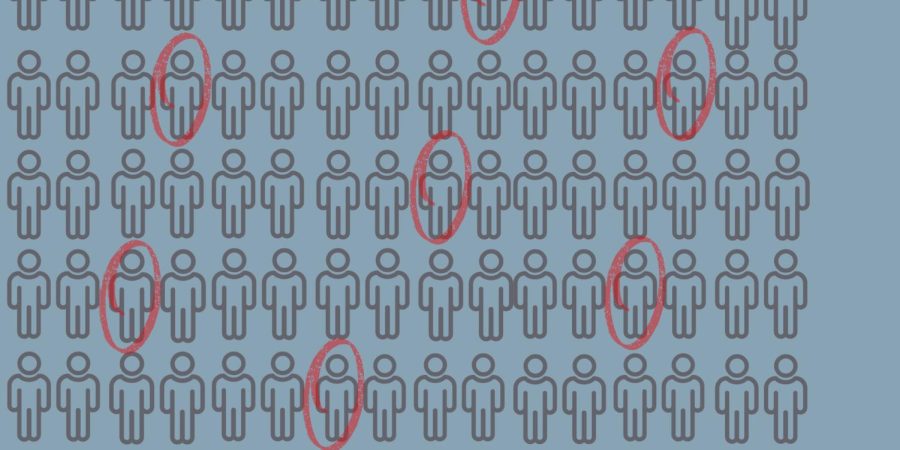It’s Time To End the Stigma Around Male Sexual Assault Victims
Historically, perspectives from people who identify as male have been left out of discussions surrounding sexual assault.
February 2, 2022
The following article contains description of sexual assault and rape.
There is a myth that has grown significantly over the years: that those who identify as male do not experience sexual assault and rape, or are only exposed through the prison system.
This is only a myth.
Although it is less common, those who identify as male are victims of sexual assault and rape, and face all the challenges that a victim of sexual assault faces, with an added stigma in comparison to those who identify as female.
Male survivors of sexual assault have similar reactions to sexual assault as women do. Both male and female survivors can experience anger, fear, anxiety, shame, self-blame, depression, and even suicidal thoughts because of their assault.
On average, men are more likely to initially respond with anger or conceal the severity of the assault. Male survivors are also more likely to face challenges with substance abuse following an assault.
Men face stigma coming out about their assaults due to societal stereotypes, including assumptions that men are always the aggressor, and beliefs that if a boy has been sexually assaulted during his childhood, he is likely to become an offender himself.
There seems to be a move in the right direction to support those who identify as men coming out about their assault stories.
On Jan. 20, influencer and TikTok star Jack Wright published a video on YouTube, shining a light on his side of his relationship with a previous friend and co-star from the reality show Hype House, Sienna Mae Gomez. Back in May 2021, one of Wright’s friends accused Gomez of sexual assault and allegedly telling Wright to “k*** himself.” The tweet was reposted by Wright’s brother.
Following these allegations, Gomez published multiple videos on her social media platforms denying all allegations, which have since been deleted.
“I unequivocally deny the allegations that I sexually assaulted Jack Wright,” Gomez said in a video posted to her Instagram and TikTok. “Making an untrue sexual assault claim is never okay. I’m beyond saddened by this situation. In order for us to all move forward, I will be taking this offline with Jack.”
Wright stayed quiet about this situation for almost a year, until now.

The 17-minute video titled “what sienna mae did to me” has over 19 million views, and over 20 thousand comments from fans, friends, and family with many supporting Wright’s decision to share his side of the story.
Wright describes four incidents in the video in which Gomez allegedly touched Wright without consent. Wright explains that the video in which Gomez denied the allegations affected Wright’s decision to tell his story.
“[The video] invalidated my feelings,” Wright said. “[It] gaslighted [me].”
Why did it take so long for Wright to address his side of the story?
This likely has to do with the stigma surrounding males experiencing sexual assault.
Statistics have shown if you were to conduct a study with 100,000 people, all identifying as men, 25,000 have or will receive unwanted sexual contact in some way during their lifetime.
One out of every 10 victims of rape identifies as a male. The notion that only those identifying as women are sexually assaulted is inaccurate and extremely harmful to the stigma surrounding men being sexually assaulted.
A significant reason why many victims of sexual assault do not share their stories is that they are scared that others will not believe them.
Wright’s story is just one of many; he is a man who was worried about others not believing him because he was sexually assaulted by a woman.

Though girls and women face a greater risk of being sexually assaulted, those who identify as males are victims. Stories of sexual assault, misconduct, and rape can be heard everywhere — but rarely by men. The stories of boys and men are kept in the dark, unacknowledged, and not discussed.
The default narrative about sexual assault is the male being the perpetrator and the female being the victim. This contributes to the societal idea that boys and men need to be strong, unemotional, and dominant. By ignoring the reality that men can be victims and should seek help, this narrative can help prevent men from sharing their experiences.
How You Can Help Break The Stigma:
- Listen. The best way for one to learn about another person’s experiences is by listening to their stories, validating their feelings and offering any support or help they may need.
- Do not ask about the details of their assault, even if you are curious about what happened and how to fully understand it. If a survivor feels safe coming to you about their assault, this alone is a big step. Don’t pressure them into learning the details. If a survivor shares specific details of their assault, try to listen in a non-reactive and non-judgemental manner.
- Promote resources and encourage contacting law enforcement that the survivor could seek guidance from. It can be extremely challenging to know how to respond when someone tells you they have experienced assault, and it’s okay to not know. However, if you are able to do some research on local resources or national research such as RAINN that may help the survivor, you should encourage them to reach out.
- Be patient when someone is healing from an assault. You can offer your support, but do not try to “fix” the situation. It is going to take time for the survivor to heal.
- Accept and respect their choices specifically about what they will be doing about the assault. Ask them how they want to proceed, what you can do to support them, and encourage them to make their own decisions. Even if you disagree, it is not your place to enforce your own opinions on what they should do about their assault. You want them to feel safe and respected.

The stigma surrounding men experiencing sexual assault contributes to a society promoting toxic masculinity. Rape and sexual assault are uncomfortable subjects, but they must not be obscured.
Hiding these experiences from others encourages the idea that it is something to be ashamed of. Being a survivor of sexual assault is not something that one should feel they need to hide. It is an experience that an individual has survived, and that must be addressed to potentially save another individual.







Heather McEvoy • Feb 4, 2022 at 8:58 pm
This is such an important topic to address. Thank you for covering this and advocating for survivors and those supporting survivors.
Santiago N. • Feb 3, 2022 at 9:37 am
Completely agree, there’s such a huge stigma but it seems to be getting better. Hopefully it goes away sooner than later. Great article!